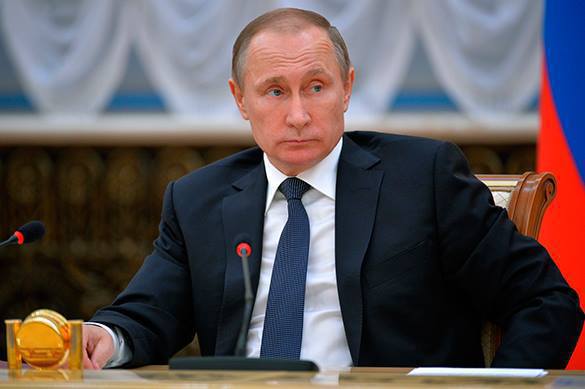Putin's Russia: From 'gas station' to major global player
Five years ago, on March 4, 2012, Vladimir Putin won the presidential election in Russia. Hardly anyone doubts that Vladimir Putin will win the election in 2018, if, of course, he decides to run for presidency.

After the reunification with the Crimea and Sevastopol in March 2014, political scientists and sociologists started talking about the phenomenon of the "Putin majority." This phenomenon unites Russian people who support Putin as president, even though they can vote for different parties at parliamentary elections. For several years, Putin's approval rating has been stable at 82-86 percent. Noting the unprecedented support for the head of state, experts say that the "Putin majority" remains stable and demonstrates a tendency to expand.
According to a study conducted by the Civil Society Development Fund in 2016, supporters of the "Putin majority," speaking about the qualities that attract them to the head of state, said that they valued Putin's diligence and his work in the interests of Russia. They are confident that Vladimir Putin will be able to ensure the development of Russia in the future. In political terms, representatives of the "Putin majority" pointed out Putin's experience, vigor, determination and willpower. In their opinion, Putin acts as a real leader, capable of leading people.
Russia has started playing one of the leading roles in international politics. "When you look at a country that has got the economic issues they have, has the demographic issues they have - very dependent on minerals and oil, has gone through no reforms - it's very remarkable he has taken his place on the world stage in the way he has since 2012," Bob Corker, the head of the Senate Committee for Foreign Relations said in a recent interview.
Another US Senator, John McCain, spoke of Russia as a "gas station country." However, two years later, Russia the gas station has developed into a country that could allegedly, in the view of many US politicians, show influence on the course and the outcome of the presidential election in the United States. At the same time, Western "partners" acknowledge that solving major international problems without the participation of Russia is impossible - be it the Middle East, the fight against terrorism, control over the proliferation of nuclear weapons, etc.
Let's get back to Russia's problems. Over the past five years, Russia has approved a number of normative acts to combat corruption. In 2013, Putin initiated the law that prohibited Russian officials, deputies, judges, employees of power structures to have bank accounts and financial assets abroad. Having real estate abroad is allowed, but it must be declared accordingly. Even earlier - in December 2012 - the head of state signed a law that obliged officials to report their expenses.
In the last few years, all Russians have become familiar with the term of import substitution. The point of this process is not about Russia's relations and friction with the West. Import substitution has given a great chance for domestic producers to develop and grow, and one can already see the success of Russian agricultural producers.
Here is another example. According to the CIA, Russia was ranked 7th in the world in 2016 on GDP indicator, following China, the European Union, the United States, India, Japan and Germany.
Pravda.Ru turned to well-known Russian citizens with a request to express their views about Putin's five years as president.
Iosif Kobzon, People's Artist of the USSR:
"The president behaves correctly as the head of the state despite all the Russophobia. Putin has restored the Russian Armed Forces and ensured Russia's defense capability. The sanctions have damaged our economy, of course, but they have also given an opportunity to revive agriculture. Our president always works, he is entirely devoted to Russia. I think that we have a wonderful president."
Karen Shakhnazarov, director, People's Artist of Russia:
"These five years in Russia's new history have been turbulent. The reunification with the Crimea is probably one of the most important events in the history of our country. The Olympics in Sochi, the rivalry with the West, in which Russia has been able to stand firm on its feet and even gain advantage at some point."
Pravda.Ru
Read article on the Russian version of Pravda.Ru
Subscribe to Pravda.Ru Telegram channel, Facebook, RSS!




